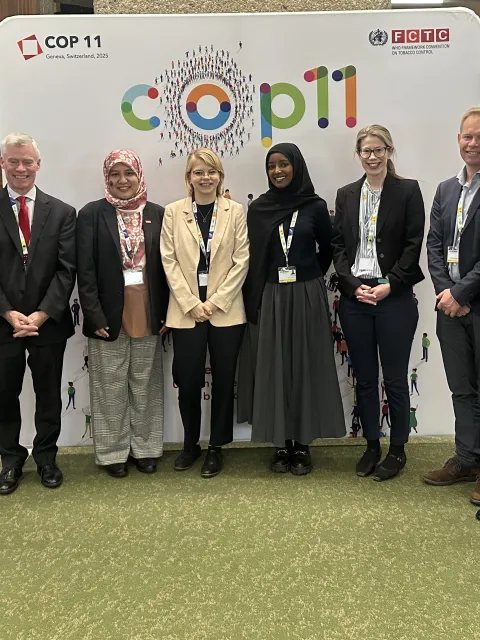Tobacco taxes are still one of the best tools to reduce cancer

In recent excellent posts on UICC’s blog space, authors have wisely reinforced that tobacco control remains a public health “best buy”; in other words, enormous benefits can be derived in terms of improving overall public health and greatly reducing health expenditures by implementing measures that reduce tobacco consumption. This is perhaps particularly true as the pandemic is hopefully entering a new phase of greater manageability. It is also critical to emphasise that tobacco control is a cancer control best buy.
Whereas most people are aware of smoking’s role in lung cancer, fewer people are aware that tobacco use is also a significant risk factor for the following cancers: bladder; blood (acute myeloid leukaemia); cervix; colon and rectum; oesophagus; kidney and renal pelvis; liver; lungs, bronchi and trachea; mouth and throat; pancreas; stomach; and voice box (larynx). Therefore, driving down tobacco use should be an ongoing central goal of nearly all cancer organisations globally.
The evidence shows clearly that all major tobacco control interventions help to decrease consumption but that raising tobacco excise taxes is the most effective and the most cost-effective intervention in our policy toolbox. The world’s first global health treaty under the World Health Organization, the Framework Convention on Tobacco Control (FCTC), dedicates all of Article 6 to it. Despite its proven efficacy, however, improvements in tobacco tax policies have been slow in most countries.
Late in 2021, our Tobacconomics team at the University of Illinois at Chicago released the second edition of the Tobacconomics Cigarette Tax Scorecard demonstrating not just that many countries are struggling to improve tobacco taxes, but precisely how governments are failing. Importantly, showing these failings provides a clear blueprint for how countries can quickly begin to use or improve this policy intervention by improving tax structures and raising tax rates to help increase prices. Taking these steps will increase the tax share of price and make tobacco products less affordable.
The figure below shows both the low average overall score (5 is the maximum) and component scores from 2014 to 2020. Notably, these scores have only improved slightly in recent years. Moreover, tobacco taxes are typically lower in lower-income countries, often because of persistent pressure from the tobacco industry and/or weaker governance.

Tobacco taxation is a “win-win-win” for societies. First, rigorous research unequivocally shows that tax increases lead to higher prices, which deter young people from starting to smoke and encourage tobacco users to quit. As a result, overall consumption goes down: a 10% increase in price will typically generate a 4-8% decrease in consumption, with greater declines among young people and those with lower incomes. Lower consumption means lower health-related costs and greater economic productivity.
The second “win” is improved equity: because lower-income people are more likely to quit or to reduce consumption, a disproportionate amount of the benefit from tax increases will go to these groups. In fact, the evidence suggests that quitting tobacco causes these households to spend more money on important things like food, housing, health and education (see evidence from Pakistan, Serbia and Vietnam). Further, household incomes tend to increase and individuals’ medical bills decrease when people quit smoking (e.g., evidence from Mexico).
Finally, and this outcome is particularly important to countries’ finance ministries and legislative finance committees: tobacco taxes almost always increase tax revenues because the decline in consumption is more than compensated by the increase in the tax rate (because tobacco is typically an inelastic good). In many countries, there’s an additional “win” when governments use these new revenues to fund pro-development sectors like health and education, and even cancer control such as in Guam.
Successful tobacco excise tax reform typically happens in countries where there is government will for policy change, sufficient technical capacity, a strong evidence base, and an active civil society. It is particularly the first and last of these conditions where cancer organisations can play a vital role in promoting improved taxation. In most countries, cancer organisations are among the most respected and support programmes and policies that engender societal wellbeing. They can be very strong spokespersons for policy change because the motivation is improved public health, not politics. Governments listen! We have seen exactly this type of active support for tobacco tax reform from cancer organisations— and governments listening— in more than a handful of countries recently including Colombia and Ethiopia.
It is critical to understand that tobacco taxation will be a continuing effort for our cancer and public health communities. Hopefully, cancer organisations will take up this mantle as they make their work plans and set priorities. Taxes are negotiated almost every year, so cancer organisations must pay attention to this calendar and engage each time in the process to register their policy preferences vigorously. They should expect strong opposition from the tobacco industry and its allies, too, but not be deterred by it because the moral and scientific higher ground is with increased tobacco taxation. There is also technical support for governments and organisations available, including through the WHO and the FCTC Secretariat and their many close partners; interested parties need only ask. Now is the time to take this tax challenge to the next level of success.
Last update
Wednesday 16 November 2022Share this page


